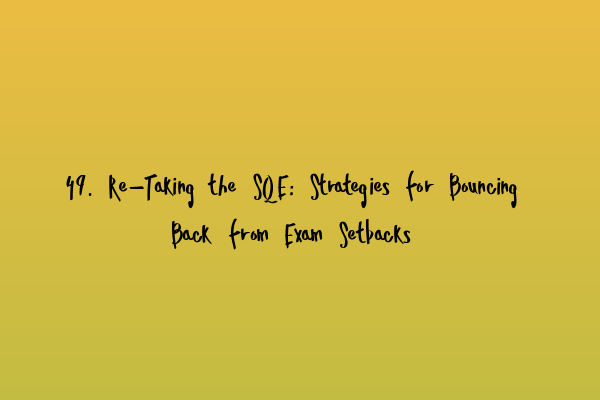Re-Taking the SQE: Strategies for Bouncing Back from Exam Setbacks
Introduction
—————-
If you find yourself in the position of retaking the SQE exams, it’s important to remember that setbacks happen, and it’s how you bounce back from them that truly matters. With the right strategies and mindset, you can turn a setback into an opportunity for growth and success. In this article, we will discuss some effective strategies to help you prepare for your SQE retakes and maximize your chances of success.
1. Assess Your Performance
—————-
The first step in bouncing back from an exam setback is to assess your performance in the previous attempt. Identify your strengths and weaknesses, and areas where you may need improvement. Did you struggle with certain topics or question types? Did you feel overwhelmed by time constraints? Understanding where you went wrong will help you prioritize your efforts and create a targeted study plan.
2. Create a Study Plan
—————-
A well-structured study plan is essential for efficient exam preparation. Break down your study material into manageable chunks and assign specific time slots for each topic. Consider using SQE 1 MCQ practice exam questions, such as those found in the SQE 1 Practice Exam Questions article, to reinforce your knowledge and improve your ability to answer multiple-choice questions accurately. Additionally, practice mock exams like those mentioned in the SQE 1 Practice Mocks FLK1 FLK2 article can help simulate the exam experience and build your confidence.
3. Seek Support and Guidance
—————-
Don’t hesitate to seek support and guidance from peers, mentors, or tutors who have experience with the SQE exams. They can provide valuable insights, tips, and resources to help you excel. Consider enrolling in SQE 1 preparation courses mentioned in the SQE 1 Preparation Courses article or SQE 2 preparation courses mentioned in the SQE 2 Preparation Courses article, which are designed to equip you with the necessary knowledge and skills to succeed in the exams.
4. Analyze Past Exam Papers
—————-
Studying past exam papers is an effective way to familiarize yourself with the structure, format, and content of the SQE exams. Look for patterns in question types, topics covered, and the level of difficulty. By analyzing past papers, you can identify recurring themes and prioritize your study accordingly. SQE exam dates mentioned in the SRA SQE Exam Dates article can help you plan your study timeline and set realistic goals.
5. Focus on Time Management
—————-
Time management is crucial during the SQE exams. Practice with time constraints to improve your speed and accuracy. Use techniques like skipping difficult questions and returning to them later, eliminating obviously incorrect answer choices, and allocating a specific time for each question. Effective time management will ensure you can complete all questions within the given time limit.
6. Review and Revise
—————-
Regular review and revision are essential components of your SQE exam preparation. Allocate dedicated time to revisit previously studied material and reinforce your understanding. Focus on areas where you struggled previously and use SQE 1 MCQ practice exam questions to test your knowledge and retention. Maintain a study schedule that allows for consistent review and revision throughout your preparation period.
Conclusion
—————-
Retaking the SQE exams is a challenging endeavor, but with the right strategies and mindset, you can turn it into an opportunity for growth and success. Assess your performance, create a focused study plan, seek support and guidance, analyze past exam papers, focus on time management, and prioritize regular review and revision. By implementing these strategies, you can approach your retakes with confidence and maximize your chances of passing the SQE exams.
Remember, setbacks happen to even the most prepared individuals. The important thing is to learn from your mistakes, adapt your approach, and keep pushing forward. Good luck on your journey to SQE success!
